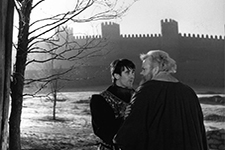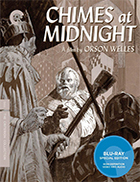Chimes at Midnight (aka Falstaff)
|  Chimes at Midnight (aka Falstaff), the third and final of Orson Welles’s three Shakespeare films, is one of the fiercely independent filmmaker’s greatest late-stage accomplishments—a very nearly magnificent amalgam of plot points, characters, and dialogue from not just one or two of the Bard’s history plays, but five of them—Henry IV, Part 1 and Henry IV, Part 2, Richard II, Henry V, and The Merry Wives of Windsor—along with narration adapted from Raphael Holinshed’s Chronicles, which is read by the great Ralph Richardson. It is a film that Welles had been working toward for more than three decades, having tried a version in 1931 called Winter of Our Discontent when he was still a teenager at the Todd School for Boys, an overly ambitious and ultimately disastrous would-be Broadway production in 1939 titled Five Kings, and finally a version titled Chimes at Midnight that he staged in 1960 in Dublin. Welles had long been fascinated by John Falstaff, a character who is often thought of as a ruffian, a disrupter, a buffoonish force of nature, but who Welles saw as a “Shakespeare’s good, pure man,” whose many flaws pale in comparison to both the flaws of those around him and to his own better qualities. Welles’s particular genius was to take Shakespeare’s history plays and strip them down to their essential tale of a son torn between his regal father and his free-wheeling mentor and friend. In the grand scale of things, Shakespeare was documenting in dramatic form the shift from medieval chivalry to modern politics, but Welles was primarily intrigued by the human dimension, which in some ways reflected his own tormented conscience regarding the death of his alcoholic father, who he abandoned in an attempt to force him to sober up, only to drive him deeper into the bottle. The film centers on the evolving relationship among Prince Hal (Keith Baxter, who also played the role in the Dublin stage production), his father King Henry IV (John Gielgud, arguably the finest Shakespearean actor of his generation), and his best friend and surrogate father John Falstaff (Orson Welles). Hal is a kind of prodigal son, spending his time boozing and womanizing at the bawdy Boar’s Head Tavern with Falstaff and his company of lay-abouts and prostitutes while King Henry laments his son’s lack of interest in being a responsible leader. For Welles, Falstaff was a boisterous, bumbling, but ultimately genuine force of life, a man who was interested primarily in carnality and rich living and was constantly out of money and having to spin ever-more fantastic fibs to cover up his various failures. Welles cuts an imposing figure as Falstaff, wielding his enormous body and paunchy face and thick beard with a sense of grotesque vitality that is infectious. You can’t help but appreciate and even admire Falstaff’s genuine sense of life (particularly the way he carouses and conflicts with Jeanne Moreau’s maternal prostitute Doll Tearsheet), which contrasts with King Henry’s moody solemnity and imperiousness. The irony, of course, is that Henry, for all his apparent propriety and importance, is an illegitimate monarch who stole the throne through violence via the murder of Richard II and must now work politically to legitimize his rule and Hal’s eventual ascension to the throne. His lies are insidious because they are cloaked in honor, while Falstaff wears his as goofy fun. That Hal eventually rejects Falstff in favor of his father’s power is what qualifies the film as a genuine tragedy and one of Welles’s most heartfelt paeans to love and loss. Falstaff is, at heart, something of a child, which is why his rejection carries such agony. Like all of Welles’s post-Hollywood films, Chimes at Midnight is an unavoidably flawed work forged out of the combined limitations of time, money, and physical resources. Welles often didn’t have his actors for more than a few weeks at a time, and he was forced to shoot all their lines and then fill out the scenes with stand-ins whose backs were turned to the camera. Most of the sound was recorded in post-production, which had its own technical limitations that resulted in dialogue being out of synch or being recorded in an environment that did not match the spatial relations we see on screen. Yet, even with those limitations, Chimes at Midnight is still an impressive work, very nearly bursting with memorable imagery and a sense of energy that rarely wanes. The streamlined nature of the storytelling and its focus on the interpersonal gives it an intimacy and a human dimension that it would have lacked had Welles gone with a more ambitious attempt to combine all or even much of the political and royal intrigue of Shakespeare’s history plays. Instead, he keeps just enough of the necessary background to give shape to the inner workings of the Falstaff-Hal-Henry triangle, but without being burdensome. Visually, Chimes at Midnight is another of Welles’s sumptuous feasts for the eyes, full of impressive framing, virtuoso camera movement (both highly controlled and purposefully chaotic), expressive camera angles, and beautiful high-contrast lighting. The cinematographer, Edmond Richard, had previously shot Welles’s The Trial (1962), and he would go on to shoot Luis Buñuel’s final three films (1972’s The Discreet Charm of the Bourgeoise, 1974’s The Phantom of Liberty, and 1977’s That Obscure Object of Desire). While the film’s sound is marred with technical issues and flaws, its imagery is consistently outstanding, lending a sense of the epic that has otherwise been discarded by the pared down narrative. The sets, which were intended to double for a film version of Treasure Island that Welles was supposed to be developing simultaneously, give the impression of a production much larger and more expensive that it was (Welles was able to convince Spanish producer Emiliano Piedra to fund the film because he promised to do it “on the cheap”). The film is also notable for its hellacious “Battle of Shrewsbury” sequence, when Henry’s forces go against the forces amassed by Henry “Hotspur” Percy (Norman Rodway), who claims to be the rightful heir to the throne. The battle, which is agonizingly long and incredibly violent, is unlike anything else that Welles had done up until that point. A carefully crafted montage of mud and blood and spears and swords and excruciating screams and bulging eyes and falling bodies, it brings to mind the Odessa Steps sequence of Eisenstein’s Battleship Potemkin (1925) or the final battle in Kurosawa’s Seven Samurai (1954) in its physical intensity and its almost abstract conveyance of battlefield bloodshed; we are literally watching the death of honor and chivalry played out in epic terms. As a stand-alone sequence, it is a force of cinematic might, but it also acts as a crucial turning point in the film, where Falstaff’s ribald joviality and penchant for grandiose falsity is turned against him. It is at this point that Hal takes his first major step away from his surrogate father figure and toward his real father, which will eventually culminate in what is perhaps Shakespeare’s most piercing line of dialogue, through which he fully rejects Falstaff and all that he stands for: “I know thee not, old man.”
Copyright © 2018 James Kendrick Thoughts? E-mail James Kendrick All images copyright © The Criterion Collection | |||||||||||||||||||||||||||||||
Overall Rating: 


 (3.5)
(3.5)


